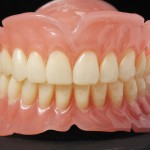
Denture stomatitis is characterised by inflammation and chronic erythema and oedema of the oral mucous membrane with the use of removable acrylic dentures. It has a multifactorial and is commonly associated with Candida spp. Conventional treatment involves improving denture hygiene, antifungals and possible rebasing or replacement of the dentures. Increasing resistance to antifungals and risk of toxicity has increased interest in the use of alternative natural products such as green tea, ginger, garlic, propolis, and some clinical trials of the agents have been conducted.
The aim of this review was to compare the safety and effectiveness of topical natural substances with conventional antifungals in the treatment of denture stomatitis.
Methods
Searches were conducted in the Cochrane Library, Embase, Latin American and Caribbean Health Sciences (LILACS), LIVIVO, Medline/PubMed, Scopus, Web of Science, Proquest Dissertations and Thesis, Google Scholar and OpenGrey databases. Randomised (RCTs) and nonrandomized clinical trials (nRCTs) comparing topical natural substances with topical anti- fungal treatment (nystatin, miconazole, or ketoconazole) were considered. Two reviewers independently selected studies, extracted data and assessed study quality using the revised Cochrane Risk-of-bias Tool for Randomized Trials (RoB 2) and the (ROBINS-I) Risk of Bias in Non-randomized Studies of Interventions tool. The primary outcome was the clinical cure rate measured by the reduction of Newton score or the resolution of clinical symptoms. Owing to study heterogeneity a narrative summary was undertaken. The certainty of the evidence was assessed using the grading the recommendations, assessment, development, and evaluation (GRADE) system.
Results
- 17 studies (14 RCTs, 3 nRCTs) involving a total of 692 patients were included.
- 8 studies were from Brazil, 7 from Iran and 2 from Cuba.
- Almost all (16) of the included studies were considered to be at high risk of bias.
- 6 studies investigated propolis in various preparations over 7-14 days.
- 2 studies investigated green tea extract or mouthwash over 14 days.
- Other products investigated included ginger, Zataria multiflora, chitosan, garlic, Artemisia, Schinus terebinthifolius Raddi, Uncaria tomentosa, Punica granatum, and Ricinus communis.
- 12 studies compared fungal load before and after treatment.
- 7 studies measured adverse effects.
- Overall, the findings suggested that the natural products appeared to have similar efficacy and safety when compared with nystatin or miconazole
- The certainty of the evidence was very low according to the GRADE assessment.
Conclusions
The authors concluded: –
Despite the improvement of denture stomatitis clinical aspects, there was very low certainty in the body of the evidence that natural products might be appropriately used in the treatment of denture stomatitis.
Future well-designed randomized controlled trials are needed to evaluate the topic better because there was high heterogeneity among the studies.
Comments
We have previously looked at several reviews looking at the management of denture stomatitis (Dental Elf – Denture Stomatitis blogs). As a generalisation they all have similar problems in that the available studies are small, short term and generally at high risk of bias. While the authors of this review have conducted a broad search and have identified a reasonable number of studies the wide range of agents assessed, and the very low quality of the available studies means that few inferences can be drawn from their findings. As denture stomatitis is thought to affect between 30-50% of complete denture wearers identifying the best approaches to managing the condition requires high quality conducted and reported RCTs of appropriate size as suggested by the review authors.
Links
Primary Paper
Inácio Silveira DQ, Lia EN, Massignan C, Stefani CM. Natural products for the treatment of denture stomatitis: A systematic review. J Prosthet Dent. 2021 Jul 8:S0022-3913(21)00315-2. doi: 10.1016/j.prosdent.2021.05.022. Epub ahead of print. PMID: 34247854.
Other references
Dental Elf – Denture Stomatitis blogs
